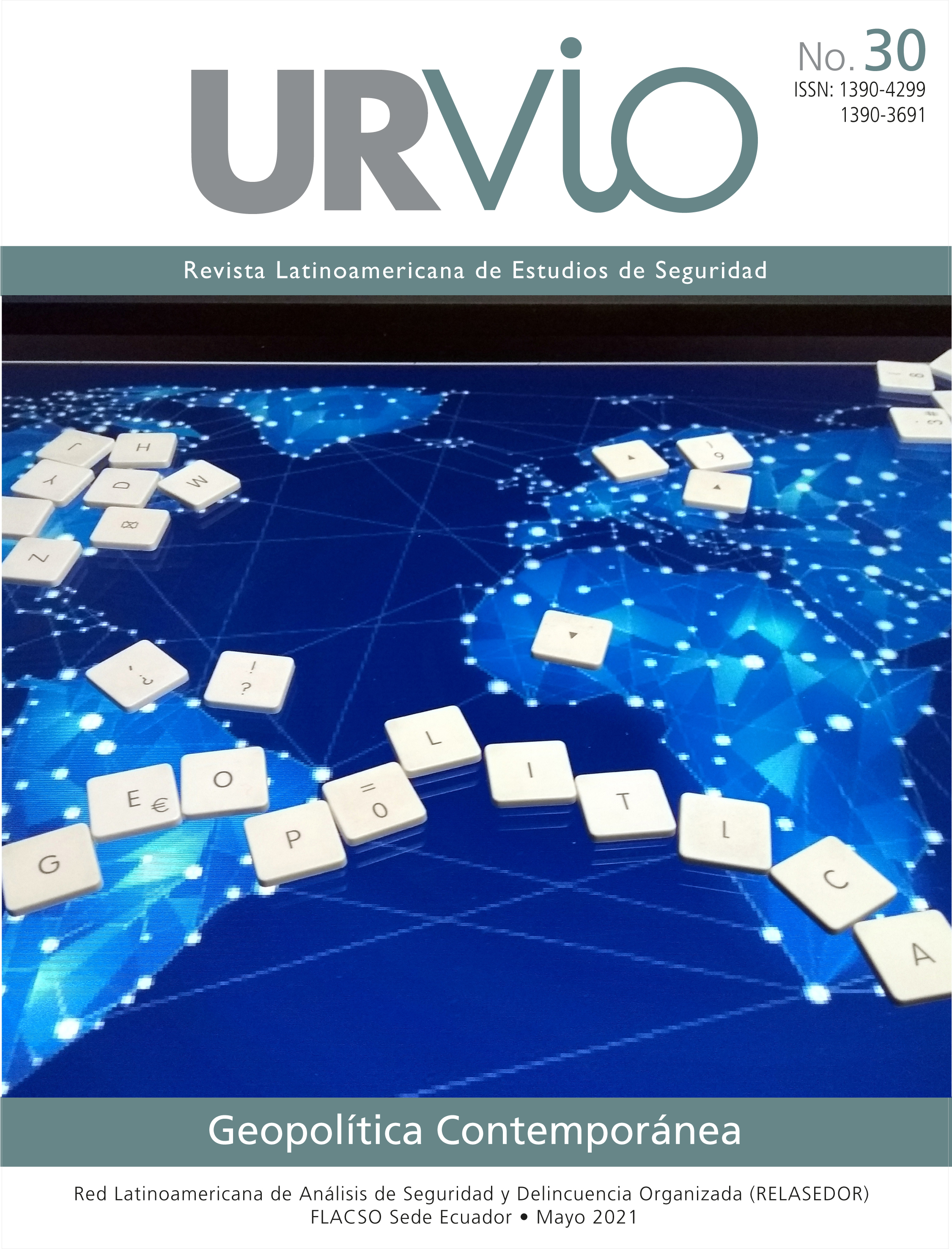La geopolítica de la violencia global en el análisis de sistemas-mundo: relevancia y problemas
Resumen
El artículo pretende reflexionar críticamente sobre el papel de la violencia y, en particular, de las guerras globales en el análisis de sistemas-mundo, acudiendo a otras perspectivas teóricas, como la estructuración y la geopolítica crítica, para entender mejor la cuestión. A partir de ello, podemos afirmar que la lucha por la supremacía no es necesariamente una lucha por la hegemonía, que resultaría inevitablemente en guerras mundiales periódicas, como preludio al ascenso de grandes potencias a un estatus hegemónico. La hegemonía se refiere más a las reglas y prácticas que constituyen un orden geopolítico, que a una determinada ordenación jerárquica de los Estados. No existe una pauta general de explicación para todas las guerras: hay que tener en cuenta tanto las configuraciones de poder global como las interrelaciones entre lo local y lo global.
Descargas
Citas
Agnew, John. 2003. Geopolitics: re-visioning world politics. Londres: Routledge.
Agnew, John. 2005. Hegemony: the new shape of global power. Philadelphia: Temple University Press.
Agnew, John. 2019. “Low geopolitics and “realta effettuale””. Rivista geografica italiana 126 (4): 198-203.
Agnew, John. 2020. “Immanuel Wallerstein, the ‘Modern World-System,’ and Radical Human Geography”. Human Geography 14 (1): 17-30. doi.org/10.1177/1942778620974056
Agnew, John, y Stuart Corbridge. 1995. Mastering Space: Hegemony, Territory and International Political Economy. Londres y Nueva York: Routledge.
Cairo, Heriberto. 2002. “El retorno de la geopolítica: nuevos y viejos conflictos bélicos”. Sociedad y Utopía: Revista de Ciencias Sociales 19: 201-228.
Cairo, Heriberto. 2018. Las guerras “virtuosas” de George W. Bush. Madrid: Trama Editorial.
Chase-Dunn, Christopher, y Hiroko Inoue. 2017. “Problems of Peaceful Change: Interregnum, Deglobalization and the Evolution of Global Governance”. IROWS Working Paper 117. https://irows.ucr.edu/papers/irows117/irows117.htm
Chase-Dunn, Christopher, y Dmytro Khutkyy. 2015. “The Evolution of Geopolitics and Imperialism in Interpolity Systems”. IROWS Working Paper 93. https://irows.ucr.edu/papers/irows93/irows93.htm
Dalby, Simon. 1990. Creating the Second Cold War. Londres: Pinter.
Denemark, Robert A. 2018. “Nuclear War in the Rivalry Phase of the Modern World-System”. Journal of World-Systems Research 24 (2): 349-371.
Doel, Marcus A. 2017. Geographies of Violence. Londres: SAGE.
Flint, Colin. 2006. Introduction to Geopolitics. Londres/Nueva York: Routledge.
Galtung, Johan. 1969. “Violence, Peace and Peace Research”. Journal of Peace Research 6: 167-191.
Galtung, Johan. 1984. There are Alternatives! Nottingham: Spokeman.
Galtung, Johan. 1985. “Twenty-five Years of Peace Research: Ten Challenges and Some Responses”. Journal of Peace Research 22: 141-158.
Giddens, Anthony. 1981. A Contemporary Critique of Historical Materialism. Vol. 1 Power, Property and The State. Londres: Macmillan.
Giddens, Anthony. 1987. The Nation-State and Violence. Volume Two of A Contemporary Critique Of Historical Materialism. Berkeley: University of California Press.
Gramsci, Antonio. 2014. “Passato e presente. Contro il bizantinismo”, https://bit.ly/3npSGhq
Harvey, David. 1985. “The Geopolitics of Capitalism”. En Social Relations and Spatial Structures, editado por Derek Gregory y John Urry, 128-163. Londres: Macmillan.
Harvey, David. 2001. Spaces of Capital: Towards a Critical Geography. Londres/Nueva York: Routledge.
Johnson, Chalmer. 2010. Dismantling the Empire: America’s Last Best Hope. Nueva York: Metropolitan Books.
Johnston, Ronald J., John O'Loughlin y Peter J. Taylor. 1987. “The Geography of Violence and Premature Death: A World-Systems Approach”. En The Quest for Peace, editado por R. Varynen, D. Senghaas, y C. Schmidt, 241-259. Londres: SAGE.
Kaldor, Mary. 1982. “Warfare and Capitalism”. En Exterminism and Cold War, editado por Edward Palmer Thompson, 261-288. Londres: New Left Books/Verso.
Mecklin, John. 2018. “It is 2 minutes to midnight. 2018 Doomsday Clock Statement”. Bulletin of the Atomic Scientists. https://bit.ly/2SxJRqr
Mecklin, John. 2020. “It is 100 seconds to midnight. 2020 Doomsday Clock Statement”. Bulletin of the Atomic Scientists. https://bit.ly/3bjLdvA
Modelski, George. 1987. Long Cycles in World Politics. Seattle: University of Washington Press.
Rabinowitch, Eugene. 1953. “The Narrowing Way”. Bulletin of Atomic Scientists 1953: 294-304, https://thebulletin.org/sites/default/files/1953%20Clock%20Statement%201.pdf
Taylor, Peter J., y Colin Flint. 2000. Political Geography: World-Economy, Nation-State and Locality. Londres: Longman.
The Bulletin. 2021. “The Doomsday Clock. A Timeline of Conflict, Culture, and Change”, https://thebulletin.org/doomsday-clock/timeline/
Tortosa, José María. 2010. “Las nuevas violencias en la crisis global”. Íconos. Revista de Ciencias Sociales 36: 41-52.
Wallerstein, Immanuel. 1984. The Politics of the World-Economy: The States, the Movements, and the Civilizations. Cambridge: Cambridge University Press.
Wallerstein, Immanuel. 1988. El capitalismo histórico. México: Siglo XXI.
Wallerstein, Immanuel. 2008. “The Depression: A Long-Term View”. Commentary 243. https://bit.ly/3niQqbT
White House. 2017. National Security Strategy of the United States. Washington, D. C.: The White House. http://bit.ly/2OFNhT9
Derechos de autor 2021 URVIO. Revista Latinoamericana de Estudios de Seguridad

Esta obra está bajo licencia internacional Creative Commons Reconocimiento-NoComercial-SinObrasDerivadas 4.0.

Urvio, Revista Latinoamericana de Estudios de Seguridad opera bajo licencia Creative Commons Reconocimiento-Sin Obra Derivada 3.0 Unported (CC BY-ND 3.0).
Los autores/as que publiquen en Urvio aceptan estos términos:
Usted es libre de compartir — copiar y redistribuir el material en cualquier medio o formato para cualquier finalidad, incluso comercial. Por tanto, autores conservan los derechos de autor y ceden a la revista el derecho de la primera publicación (CC BY-ND 3.0), que permite a terceros la redistribución, comercial o no comercial, de lo publicado siempre y cuando el artículo circule sin cambios.
Existen las siguientes condiciones para los autores:
Reconocimiento — Debe reconocer la autoría, proporcionar un enlace a la licencia e indicar si se han realizado cambios. Puede hacerlo de cualquier manera razonable, pero no de una manera que sugiera que tiene el apoyo del licenciador o lo recibe por el uso que hace.
Sin Obra Derivada — Si remezcla, transforma o crea a partir del material, no puede difundir el material modificado.
Para más detalles, visitar la página de Creative Commons (CC).

















